第16章
Perhaps it is just as well, therefore, to determine their nature and number. A man may be ignorant, then, of who he is, what he is doing, what or whom he is acting on, and sometimes also what (e.g. what instrument) he is doing it with, and to what end (e.g. he may think his act will conduce to some one's safety), and how he is doing it (e.g. whether gently or violently). Now of all of these no one could be ignorant unless he were mad, and evidently also he could not be ignorant of the agent; for how could he not know himself? But of what he is doing a man might be ignorant, as for instance people say 'it slipped out of their mouths as they were speaking', or 'they did not know it was a secret', as Aeschylus said of the mysteries, or a man might say he 'let it go off when he merely wanted to show its working', as the man did with the catapult. Again, one might think one's son was an enemy, as Merope did, or that a pointed spear had a button on it, or that a stone was pumicestone; or one might give a man a draught to save him, and really kill him; or one might want to touch a man, as people do in sparring, and really wound him. The ignorance may relate, then, to any of these things, i.e. of the circumstances of the action, and the man who was ignorant of any of these is thought to have acted involuntarily, and especially if he was ignorant on the most important points; and these are thought to be the circumstances of the action and its end. Further, the doing of an act that is called involuntary in virtue of ignorance of this sort must be painful and involve repentance.
Since that which is done under compulsion or by reason of ignorance is involuntary, the voluntary would seem to be that of which the moving principle is in the agent himself, he being aware of the particular circumstances of the action. Presumably acts done by reason of anger or appetite are not rightly called involuntary. For in the first place, on that showing none of the other animals will act voluntarily, nor will children; and secondly, is it meant that we do not do voluntarily any of the acts that are due to appetite or anger, or that we do the noble acts voluntarily and the base acts involuntarily? Is not this absurd, when one and the same thing is the cause? But it would surely be odd to describe as involuntary the things one ought to desire; and we ought both to be angry at certain things and to have an appetite for certain things, e.g. for health and for learning. Also what is involuntary is thought to be painful, but what is in accordance with appetite is thought to be pleasant.
Again, what is the difference in respect of involuntariness between errors committed upon calculation and those committed in anger? Both are to be avoided, but the irrational passions are thought not less human than reason is, and therefore also the actions which proceed from anger or appetite are the man's actions. It would be odd, then, to treat them as involuntary.
2
Both the voluntary and the involuntary having been delimited, we must next discuss choice; for it is thought to be most closely bound up with virtue and to discriminate characters better than actions do.
Choice, then, seems to be voluntary, but not the same thing as the voluntary; the latter extends more widely. For both children and the lower animals share in voluntary action, but not in choice, and acts done on the spur of the moment we describe as voluntary, but not as chosen.
Those who say it is appetite or anger or wish or a kind of opinion do not seem to be right. For choice is not common to irrational creatures as well, but appetite and anger are. Again, the incontinent man acts with appetite, but not with choice; while the continent man on the contrary acts with choice, but not with appetite.
Again, appetite is contrary to choice, but not appetite to appetite.
Again, appetite relates to the pleasant and the painful, choice neither to the painful nor to the pleasant.
Still less is it anger; for acts due to anger are thought to be less than any others objects of choice.
But neither is it wish, though it seems near to it; for choice cannot relate to impossibles, and if any one said he chose them he would be thought silly; but there may be a wish even for impossibles, e.g. for immortality. And wish may relate to things that could in no way be brought about by one's own efforts, e.g.
that a particular actor or athlete should win in a competition; but no one chooses such things, but only the things that he thinks could be brought about by his own efforts. Again, wish relates rather to the end, choice to the means; for instance, we wish to be healthy, but we choose the acts which will make us healthy, and we wish to be happy and say we do, but we cannot well say we choose to be so; for, in general, choice seems to relate to the things that are in our own power.
For this reason, too, it cannot be opinion; for opinion is thought to relate to all kinds of things, no less to eternal things and impossible things than to things in our own power; and it is distinguished by its falsity or truth, not by its badness or goodness, while choice is distinguished rather by these.